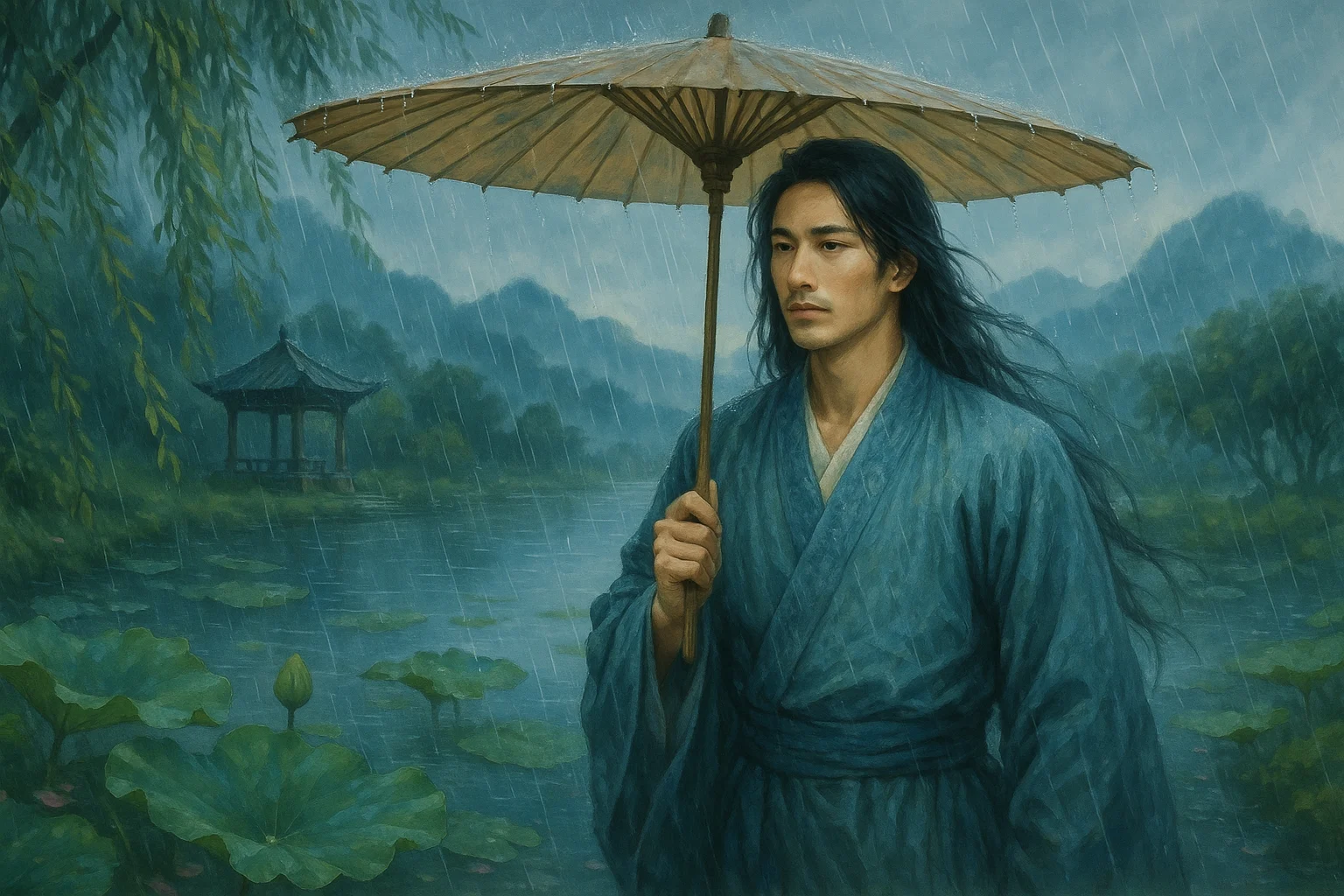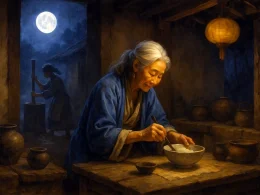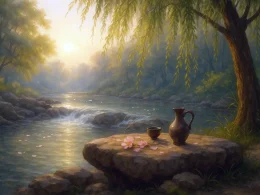Plum blooms are lazy to greet spring’s new face,
Not that spring comes late to this place.
See how they bloom before all others dare—
Claiming no bond with spring, yet claiming spring’s care.
By moonlit breeze, they lean close to my gaze,
Smiling: "You’re thin as us in spring’s maze!"
How oft I’ve dashed through rain by sparse fence,
To find green fruit on boughs—life’s recompense.
Original Poem
「虞美人 · 梅花自是于春懒」
梅花自是于春懒。不是春来晚。
看伊开在众花前。便道与春无分、结因缘。风前月下频相就。笑我如伊瘦。
吕本中
几回冲雨过疏篱。已见一番青子、缀残枝。
Interpretation
Composed during the Southern Song Dynasty amidst ongoing warfare, this lyric reflects scholars' tendency to seek solace in nature. The plum blossom—long emblematic of purity, resilience, and unyielding spirit—serves here as both subject and mirror. Lü Benzhong anthropomorphizes the flower, aligning its solitary grace with his own lean, uncompromising stance. Through delicate portraiture and philosophical musing, the poem elevates floral observation to existential meditation.
First Stanza: "梅花自是于春懒。不是春来晚。看伊开在众花前。便道与春无分、结因缘。"
Méihuā zì shì yú chūn lǎn. Bùshì chūn lái wǎn. Kàn yī kāi zài zhòng huā qián. Biàn dào yǔ chūn wú fèn, jié yīnyuán.
The plum, by nature, is slow to heed spring's call—
not that spring tarries.
See how she blooms before all others,
claiming no ties to spring,
yet bound to it forever.
The stanza opens with playful paradox: the plum's "slowness" ("懒") suggests willful independence rather than tardiness. Blooming ahead of season, she exists both apart from and essential to spring—a metaphor for the poet's own relationship with societal currents.
Second Stanza: "风前月下频相就。笑我如伊瘦。几回冲雨过疏篱。已见一番青子、缀残枝。"
Fēng qián yuè xià pín xiāng jiù. Xiào wǒ rú yī shòu. Jǐ huí chōng yǔ guò shū lí. Yǐ jiàn yī fān qīng zǐ, zhuì cán zhī.
In wind, under moonlight, she keeps me company,
mocking how I match her leanness.
Through rain I've crossed the sparse fence time and again—
now green fruits hang
from her bare boughs.
Here, communion deepens: the plum becomes confidante and mirror, her "mockery" a badge of kinship. The "green fruits" ("青子") on "bare boughs" ("残枝") transform decay into continuity, echoing the Southern Song ethos of finding resilience in ruin.
Holistic Appreciation
This lyric transcends floral homage to explore autonomy and legacy. The first stanza's plum, blooming outside seasonal logic, embodies principled detachment; the second reveals intimacy between observer and observed, culminating in life persisting through adversity ("green fruits"). Lü's genius lies in making the personal botanical—his "leanness" both physical and moral, the fruits both literal and symbolic of cultural endurance.
Artistic Merits
- Anthropomorphic Mastery
The plum is granted agency ("slow to heed"), humor ("mocking"), and generativity ("green fruits"), blurring human and natural realms. - Paradox as Structure
"No ties to spring, yet bound forever" encapsulates the scholar's dilemma: serving the state while preserving integrity. - Symbolic Economy
"Sparse fence" implies isolation; "rain" suggests trials; "green fruits" promise renewal—each image multivalent. - Layered Temporality
The poem moves from anticipatory bloom to retrospective fruiting, compressing life cycles into lyrical instant.
Insights
The plum teaches that true independence lies not in rejection but in self-defined rhythms. Its "slowness" isn't indolence but discernment; its post-storm fruits prove that endings seed beginnings. For Song literati navigating political turmoil, such flora offered both model and solace: to stand apart like winter blooms, yet—through writings like these "green fruits"—ensure one's essence outlasts the storms of dynasty.
About the Poet

Lü Benzhong (吕本中 1084 - 1145), a native of Shouxian in Anhui, was a renowned poet and Neo-Confucian scholar of the Southern Song Dynasty. As a key theorist of the Jiangxi Poetry School, he proposed the concept of "living method" (huofa), advocating for natural variation within established poetic rules. With over 1,270 surviving poems, his Genealogy of the Jiangxi Poetry School (Jiangxi Shishe Zongpai Tu) established Huang Tingjian as the school's patriarch, profoundly influencing Song poetic theory and serving as a bridge between the Jiangxi School and the Four Masters of the Mid-Song Revival.












